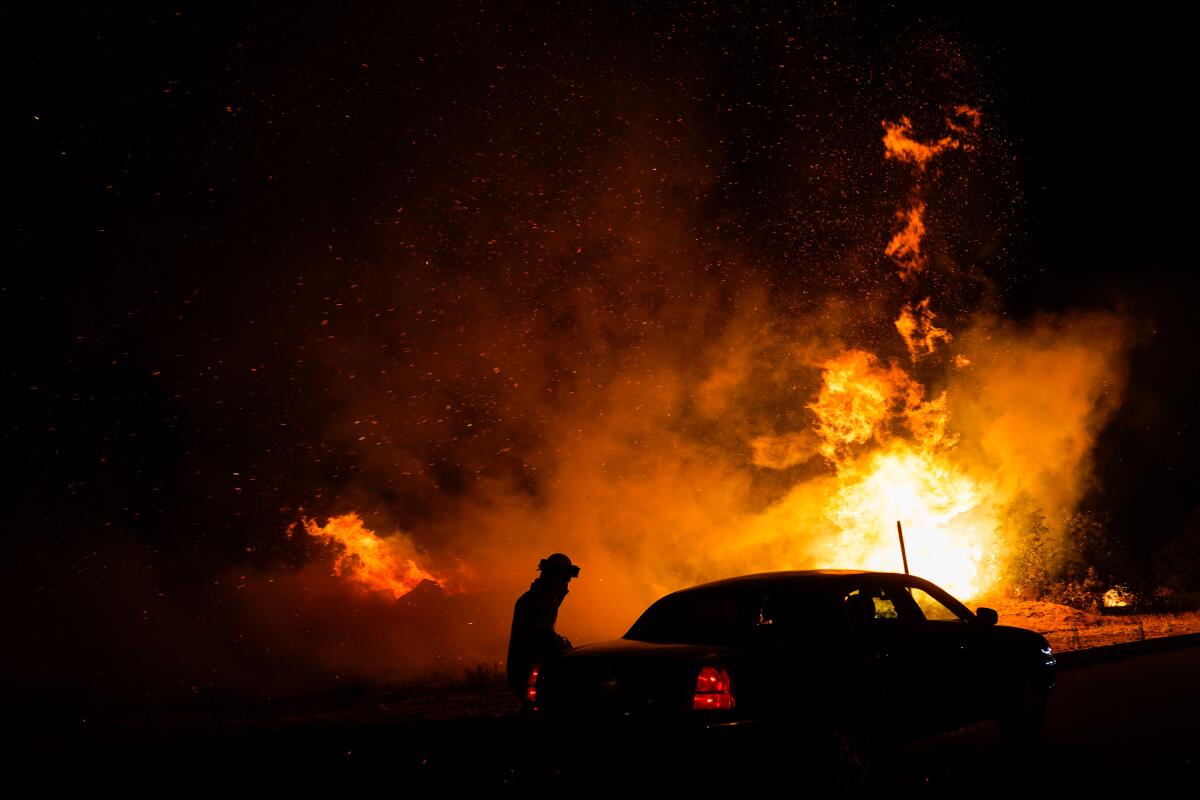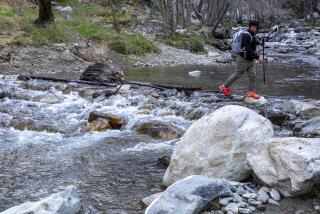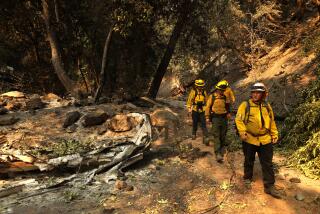These hikers wanted a pandemic getaway. They ended up barely escaping the Creek fire

When Mandy Keathley began hiking the John Muir Trail, she expected the journey of over 200 miles to take about 18 days.
The 32-year-old hadn’t made plans for the summer. So when she got a month off from work, she figured it was the perfect time to spend a few weeks in the open air. She packed a 45-liter backpack with her tent, sleeping bag, stove, food, water filtration and clothes.
What she didn’t expect was for her solo hike to go up in smoke and end — about a week after it started — in a predawn evacuation Tuesday on a military helicopter.
“That certainly never crossed my mind when I hit the trail,” the Oakland resident said.
Hundreds of people endured similar surreal experiences trapped in remote locations of the Sierra Nevada by the destructive Creek fire. The blaze grew to more than 100,000 acres over the Labor Day weekend and left hikers, campers and others stranded with no apparent way out.
By 2 p.m. Tuesday, California Army National Guard helicopter crews had rescued a total of 373 people and 16 dogs.
“They very easily, very easily, could have turned around and said the smoke made that mission too dangerous, but they went in anyway,” Gov. Gavin Newsom said at a briefing Tuesday. “They saved many, many lives, and that’s just an example of the kind of heroism that is a big part of this moment as well.”
The rescues began Saturday after the Creek fire, which ignited Friday evening about six miles to the west, jumped the San Joaquin River and made a run toward the Mammoth Pool Reservoir.
That’s where Alec Ziff and a friend had decided to celebrate Ziff’s 26th birthday, which fell on Labor Day. That morning, they woke up to smoke but thought it seemed far off in the distance.
The two spent the morning kayaking and hiking, before heading to Wagner’s Store to buy ice. There, they learned that the fire had gotten worse and they needed to evacuate.
They headed to the lake to paddle back to their tent and gather their things. From the lake, they started to see flames at the top of the mountain amid vicious, swirling winds and smoke. The two grabbed their belongings before getting back on the water.
In the lake, Ziff said, the waves reached five or six feet and eventually pushed the kayak over. Ziff, who was carrying two backpacks filled with clothes, got tangled in the tent they had brought onboard and lost his grip on the kayak. He started getting dragged in the water.
“At that point, I didn’t think I was going to make it,” Ziff said. “I’m trying to get everything loose, and I can see fire all around me.”
Eventually, Ziff freed himself and the pair reached the other side of the lake to wait it out with others. That night, hundreds were rescued by helicopter crews, but about 15 of them, including Ziff and his friend, decided to stay behind to ride out the fire.
Those who stayed shared an oxygen tank and raided ice chests to stock up on food. On Sunday, cell service went down, and they were “essentially stranded,” he said.
Then, on Sunday night, Ziff spotted three flashlights coming down the hill toward them, held by U.S. Forest Service workers. By that point, the adventure was over for Ziff.
“In that moment, I knew we were going to get out,” he said. “I didn’t care how we got out, I didn’t care if it was by ATV, or helicopter or if they had made a path for us to walk up. I just wanted to get out.”
Ziff ended up driving his own car out in a three-hour caravan headed toward Bass Lake. He and his friend stayed in a hotel in Oakhurst, where they celebrated Ziff’s birthday with a few beers.
On Saturday, Juliana Park was with a group of four friends backpacking in the mountains northeast of the Mammoth Pool Reservoir. They had planned the trip weeks in advance — each of them getting tested beforehand for COVID-19 — wanting to take advantage of the long weekend.
“Obviously, if we had known how dire the situation over there would be, we wouldn’t have left the Bay Area,” the 24-year-old said.
About an hour into the hike Saturday, the group heard thunder and took that as a sign to turn back. They hiked uphill, and by the time they reached their car “it was raining ash.” The sky was an ominous orange.
As they drove, they encountered a woman — who they believe was a forest service worker — who led them down the road with her red lights flashing. She instructed them to drive through the fire on either side, as it was their only way down.
Throughout the drive, Park kept telling her friend to “just keep going.” Park believes the flames they saw were part of a spot fire possibly caused by lightning.
“We just got really, really lucky,” Park said, crediting the woman who helped lead them down. “Had we not seen her maybe 10 minutes prior, we would not have been so lucky.”
After starting her backpacking trip on Aug. 31, Keathley didn’t see smoke until Saturday when she stopped at Vermilion Valley Resort, a modest way station by Edison Lake, to resupply her food.
Although it was “a little bit scary,” Keathley said, the fire still seemed to be pretty far off. The next morning, she decided to head out, trying to go south on the John Muir Trail in the hopes of getting away from the smoke.
But after nine miles, the smoke didn’t get better, and Keathley struggled to breathe. After learning that evacuations were happening at Vermilion, she decided to turn back.
“I didn’t feel comfortable continuing on the trail,” she said. Other backpackers kept going.
About 50 people, including Keathley, sought refuge at Vermilion — where hikers on the John Muir and Pacific Crest trails resupply. Staff provided them with food and posted updates on social media.
Record heat. Raging fires. What are the solutions?
Get Boiling Point, our newsletter about climate change, the environment and building a more sustainable California.
You may occasionally receive promotional content from the Los Angeles Times.
David Mau, who runs the kitchen at Vermilion in the summers, left Sunday after the wind shifted and brought more smoke to the area. As he drove down toward Huntington Lake, he said, “it just looked like lava, the whole valley was glowing.”
“I’ve been up there a quarter-century, I’ve never seen anything like that,” he said. California Highway Patrol eventually escorted him and other drivers out.
Back at Vermilion, deputies arrived Monday to help everyone leave and the group began packing their bags and hopping in cars. At the last minute, they were told it was called off as it wasn’t safe.
That night, the Fresno Fire Department said crews tried to get to people at Lake Edison and China Peak, but “rescue efforts were unsuccessful [as] military pilots tried valiantly to land, but heavy smoke conditions prevented a safe approach.”
Many of them wouldn’t get out until Tuesday. Keathley was one of 11 people who got into a helicopter to head to Fresno about 4:30 a.m.
“I had some hikers asking me if I had plans to try to continue the trail if things calmed down. I just realized at that point, the trail is always there,” Keathley said. “I had a beautiful week on the trail. It’s not really what I expected and I certainly would love to have finished if I could have, but at that point I was really interested in getting out. I felt pretty trapped.”
Times staff writer Taryn Luna contributed to this report.
More to Read
Sign up for Essential California
The most important California stories and recommendations in your inbox every morning.
You may occasionally receive promotional content from the Los Angeles Times.











